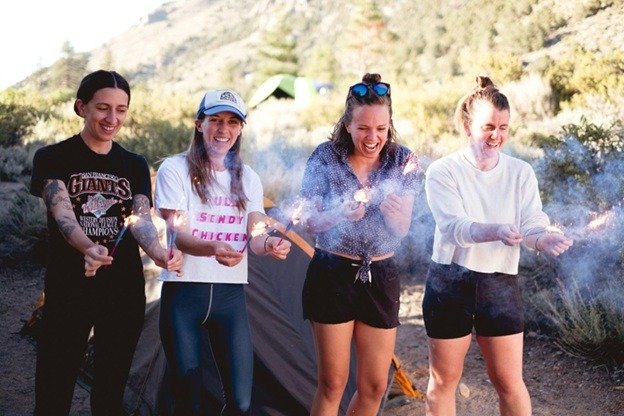Motivation
Camp Counselor Jobs That Build Leadership Skills

Being a camp counselor is more than just a summer job. It is an opportunity to grow as a person while helping others.
Working with children and teens in a camp setting teaches responsibility, teamwork, and problem-solving. These experiences can build strong leadership skills that last a lifetime.
In this article, we will explore the many benefits of camp counselor jobs and how they help you develop as a leader.
Learning to Take Responsibility
One of the first lessons of being a camp counselor is learning responsibility. You are responsible for the safety and well-being of campers. This means making sure everyone follows the rules, stays safe, and enjoys their time. Taking responsibility every day helps you develop accountability. Leaders need to be responsible for their actions and decisions, and camp counseling gives you that experience early on.
For example, if a camper forgets their water bottle or gets lost during an activity, it is up to the counselor to step in calmly and resolve the issue. Over time, you become more confident in handling both small and large responsibilities. This skill also helps in school, work, or volunteering because you are trusted to manage tasks independently.
Improving Communication Skills
Communication is key in leadership. Camp counselors must:
- explain activities clearly
- give instructions
- resolve conflicts
Talking to campers of different ages teaches you how to adjust your communication style. You also learn to listen carefully. Being a good listener is just as important as speaking clearly.
For instance, younger campers might need simple, step-by-step instructions, while older campers might respond better to detailed explanations. Learning to read the room and adjust your approach builds confidence in public speaking and everyday interactions.
Building Teamwork
Leadership often involves working with a team. As a camp counselor, you work closely with other staff members. Planning activities, solving problems, and supporting each other are all part of the job. Learning how to collaborate and trust others makes you a stronger leader.
For example, if the arts and crafts session overlaps with a sports activity, counselors must coordinate to make sure both groups are supervised. Working together ensures smooth operations and happy campers. This teamwork skill is transferable to any:
- group project
- work environment
- community activity
Handling Challenges and Problem-Solving
Camps are full of unexpected situations. A camper might get hurt, someone might get homesick, or an activity may not go as planned. As a counselor, you must think quickly and find solutions. These problem-solving skills are essential for leadership.
For example, if it starts raining during a planned outdoor event, you may need to move everyone indoors or adjust the activity quickly. Being able to stay calm under pressure and find solutions teaches resilience. Leaders often face sudden challenges. This experience makes you ready to tackle problems efficiently and confidently.
Learning Time Management
Camp schedules are busy. Counselors have to manage activities, meal times, rest periods, and special events. You also have to balance fun with responsibilities. Learning to plan your time effectively helps you prioritize tasks and meet deadlines.
For example, a counselor may need to set up a scavenger hunt while also checking that campers are safe during swimming time. Being organized and managing time effectively prevents stress and ensures the camp runs smoothly. Time management is a skill that leaders use daily to balance work, meetings, and personal life while still achieving goals.
Developing Confidence
Being in charge of a group of campers builds self-confidence. You learn to trust your decisions and abilities. Each day, as you guide and support campers, your confidence grows. This self-assurance carries over into other areas of life.
For example, encouraging a shy camper to join a group activity requires patience and belief in your ability to guide them. When the camper participates successfully, it boosts your confidence. Confident leaders inspire and motivate others because they show belief in themselves and in their team.
Practicing Conflict Resolution
Conflicts are normal in any group setting. At camp, you may have to mediate disagreements between campers or even fellow counselors. Learning how to handle conflicts calmly and fairly is an essential leadership skill.
For example, if two campers argue over a game, you must listen to both sides, suggest a solution, and help them move forward. Learning to stay calm, remain fair, and think logically builds strong conflict resolution skills. Leaders who handle conflicts well maintain a positive and productive environment for their teams.
Encouraging Creativity
Camp activities often involve games, arts, and outdoor adventures. Counselors are encouraged to be creative and come up with new ways to engage campers. Creativity is an important part of leadership because it allows you to think outside the box and solve problems in innovative ways.
For instance, if a scheduled activity is not popular with campers, you might create a new game on the spot. Leaders who are creative can adapt to changing situations and inspire others to do the same. Creativity also encourages innovation, which is valuable in school, business, and community projects.
Building Emotional Intelligence
Working with children and teens helps you develop emotional intelligence. You learn to understand others’ feelings, show empathy, and respond to emotional needs.
For example, if a camper is nervous about performing in a talent show, a counselor can provide encouragement and support. Understanding emotions helps you connect with people on a deeper level. Leaders with strong emotional intelligence can build trust, manage relationships, and guide their teams with compassion and understanding.
Creating Lasting Connections
Camp counselors meet people from different backgrounds. You make friends with fellow counselors, campers, and even parents. Building these relationships teaches social skills, networking, and cooperation.
For example, you may work closely with a fellow counselor to plan a challenging activity. By sharing responsibilities and supporting each other, you create a lasting friendship. Many people choose camp counselor jobs because they want this combination of experience, growth, and connection.
All About Camp Counselor Jobs That Build Leadership Skills
Camp counselor jobs are more than a summer experience. They are a stepping stone to building leadership skills that will benefit you for years. From learning responsibility and communication to developing confidence and emotional intelligence, the lessons learned as a counselor prepare you for future challenges.
By working with campers and staff, you grow as a leader and as a person. These benefits make camp counselor jobs an excellent opportunity for anyone looking to develop strong, lasting leadership skills.
Looking for more tips and ideas? We’ve got you covered. Check out some of our other posts now.
-

 Quotes3 years ago
Quotes3 years ago53 Motivational Gym Quotes to Fuel Your Workout
-

 Quotes10 years ago
Quotes10 years ago50 Most Powerful Quotes Ever Spoken
-

 Motivation5 years ago
Motivation5 years ago4 Fun New Hobbies To Try This Year
-

 Quotes2 months ago
Quotes2 months ago100 Motivational Quotes to Inspire You in 2026
-

 Quotes2 years ago
Quotes2 years ago43 Inspirational Quotes About Thoughts
-

 Quotes3 years ago
Quotes3 years ago105 Motivational Quotes by Famous People
-

 Quotes7 months ago
Quotes7 months ago100 Motivational Quotes to Start Your Day with Positivity
-

 Quotes2 years ago
Quotes2 years ago77 Morning Motivational Quotes to Kickstart Your Day































